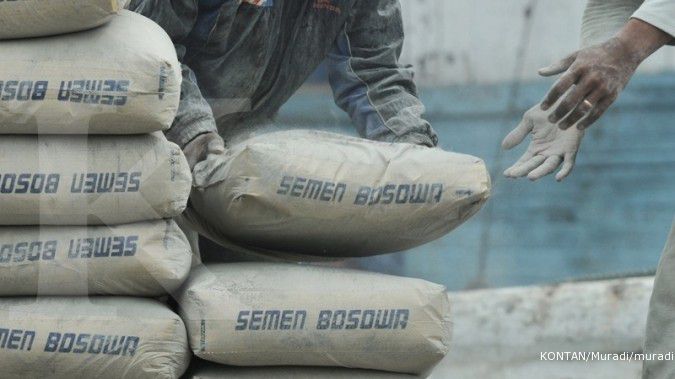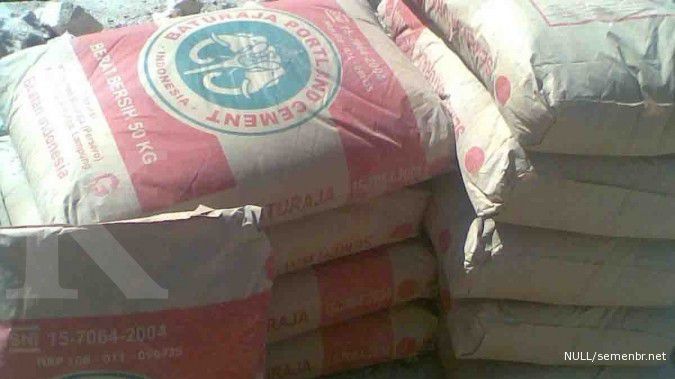JAKARTA. Due to the weakening of the rupiah against the US dollar, state-owned cement maker PT Semen Baturaja needs to make some adjustments to its plan to develop a new factory, including delaying its purchase of machinery.
The company is confident the construction of the new factory will be on schedule.
Semen Baturaja president director Pamudji Rahardjo said the Rp 2.5 trillion factory will be located in Jambi, Sumatra. According to him, initial calculations for the project were based when the rupiah was at 9,500 per US dollar.
The weakening of the rupiah severely affected the company’s plan, that includes purchasing machinery from overseas. “About 40 to 50 percent of the total investment is allocated to buy machinery,” Pamudji said.
He added that the company was working on a new valuation of the investment with higher exchange rate, as the currency has passed 11,000. The currency dropped by 3.2 percent and stood at 11,515 per dollar on Tuesday, according to prices from local banks compiled by Bloomberg.
Pamudji said Semen Baturaja, whose shares are traded on the Indonesia Stock Exchange under the code SMBR, didn’t expect any delay to start the plant construction.
“We cannot postpone the plant construction because developing a cement factory needs time. We may see pressure now, but things can be better next year,” Pamudji said.
He added that the company would delay spending for machinery and reduce the plant capacity so that construction will start on schedule without weighing down the company.
Under the plan, Semen Baturaja is expecting the new cement plant to be ready and begin operations in the fourth quarter of 2016.
Indonesian cement producers are in expansion phases in an attempt to survive from tough competition. The cement makers are short of capacity amid soaring demands, particularly supported by booming property and infrastructure projects.
The promising market has also attracted foreign cement makers to invest in the country by building new cement factories in various areas, leading to tough competition.
Domestic cement sales volume jumped 17 percent in 2011 and 14.5 percent in 2012.
The country’s cement market fell in August by 6 percent to 3.4 million tons year on year, according to figures from the Indonesian Cement Association. The decline, an analysts said, was due to weak demand particularly during the Idul Fitri holidays.
The lower sales volume in August put pressure on the cement market. As many as 36.3 million tons of cement was sold in the first eight months of the year, an increase of 5.7 percent compared to the same period last year.
The lower growth in cement sales this year is related to pressure in the country’s economy, an analysts said.
“We are quite surprised with the sharp decline of bulk cement sales, which dipped by 14 percent year on year and 50 percent month on month. We think that the weakness in bulk cement sales is possibly due to the US dollar-rupiah volatility,” Liliana Bambang, an analyst with PT Mandiri Sekuritas, said in a research note. (Raras Cahyafitri)
Baturaja’s expansion hit by rupiah weakening
September 11, 2013, 02.09 PM
/2013/02/12/892748301.jpg)
ILUSTRASI. Penari membawakan tarian Sriwijaya Jaya saat pembukaan Pra KTT Pertama Indonesia (Y20 Pre-Summit) 2022 di Palembang, Sumatera Selatan, Sabtu (19/3/2022). ANTARA FOTO/Nova Wahyudi/rwa.
Source: The Jakarta Post
| Editor:
Latest News
-
February 24, 2026, 03.38 PM
Eni to Reach Final Investment Decision for Indonesia Gas Projects Next Month
-
February 24, 2026, 01.00 PM
Asia Stocks Try to Steady after Wall Street Selloff Sims Mood
-
February 23, 2026, 04.50 PM
Wall Street Futures and Dollar Slide on Trump Tariff Tumult
-
February 23, 2026, 02.17 PM
Indonesia's Government Spending Jumps 26% in January 2026
-
February 23, 2026, 01.47 PM
Indonesia's Government Spending Jumps 26% in January
-
February 21, 2026, 06.00 AM
Indonesia's Pertamina to Maintain Bidding Process for US Energy Imports
-
February 20, 2026, 01.23 PM
Indonesia Secures 19% Tariff Deal with US, Palm Oil and Other Commodities Exempt
-
February 20, 2026, 08.33 AM
Indonesia, US Sign Agreement on Reciprocal Trade, Indonesian Ministry Says
-
February 19, 2026, 08.12 AM
Indonesia, Freeport Units Sign MoU to Extend Mining Permit beyond 2041












